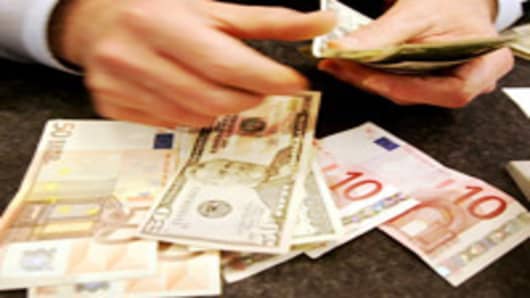Worries about a dramatic decline in the value of the dollar may be overdone, economists say.
The U.S. currency has plummeted since Tuesday's surprisingly steep cut in interest rates by the Federal Reserve, reaching a fresh low against the Euro and parity with the Canadian dollar for the first time in three decades.
And with speculation that the Fed is likely to cut rates further to ward off a recession, some traders are betting the dollar is headed for more sharp declines.
But several economists say that’s unlikely. On Friday, the dollar recovered somewhat as traders speculated that the currency's decline had gone too far.
"I’m not concerned right now," says Josh Bivens, an economist with the American Policy Institute in Washington. "If (the Euro) stops at the 1.40 level against the dollar, then it’s a non-story."
"It is at or close to the lows we saw in 1995," adds Ram Bhagavatula, an economist by training, who’s now managing director of the hedge fund Combinatorics Capital. "What you’re seeing is short term responses to interest rate cuts. These kinds of knee-jerk things get washed over."
Looking at History
History bears that out. The dollar’s broader decline over the past two decades has triggered periods of worry.
After the so-called Plaza Accord in 1985, in which the U.S. and its major trading partners agreed to the idea of a weaker dollar, sustained declines in the U.S. currency triggered alarms on Wall Street ahead of the stock market crash of 1987.
A decade later, the dollar wilted again, only to began a powerful appreciation that ran through 2002.
So why all the worry? "People think there’s a direct correlation between the value of the dollar and the health of the economy, " says Bivens
The current alarm over the dollar comes at a time when Wall Street, Corporate America and Washington are reaping the rewards of a weak currency.
Exports have spiked, bringing jobs, profits and higher stock prices. The Bush Administration, despite talking about a strong dollar, has seen the once ballooning U.S. trade deficit pared with many of the nation’s major trading partners in Europe.
"I hear no complaints from the U.S. manufacturing sector, " chides Bhagavatula.
Sam Stovall, chief investment strategist and Standard & Poor’s points out that some 45% of the revenue of the S&P 500 comes from overseas. S&P is forecasting a 5% decline in the dollar this year and next, based on a trade-wrighted basket of currencies.
That bounty, however, has not silenced the worry-warts, who say a rapidly depreciating in the dollar could re-ignite inflation--mainly by increasing the cost of goods and services the voracious American economy consumes, making it harder to the Fed to cut interest rates.
Dismissing Inflation Worry
Bhagavatula and others dismiss that inflation concern. "Exchange rates are much more volatile than the economic fundamentals, " he says, adding that he doesn’t think the markets are expecting a U.S. recession.
Nor do any of those interviewed for this story expect the Fed to factor the dollar into its interest rate decisions.
"A gradual and orderly decline in the dollar is fine," adds Jim Awad, chairman of W.P. Stewart Asset management, which overseas $6 billion in what it calls quality large cap growth stocks. "What’s happening now is that it is all in the headlines. If this goes on it will create a negative psychology."
Awad doubts that will happen, partly because he expects third-quarter earnings reports due out in the coming weeks to be strong enough to stop any meaningful dollar decline.
Talk of the dollar’s demise has been exaggerated for decades and usually reflects short-term thinking.
William Silber, an economist and professor at NYU’s Stern School of Business, says "the hand-writing is just wasted energy." He says there’s no reason yet to doubt the dollar’s status as the global economy’s reserve currency.
Silber, whose latest book, "When Washington Shut Down Wall Street: the Great Financial Crisis of 1914 and the Origins of America’s Financial Supremacy," says "the value of a currency is always based on supply and demand and right now there are too many dollars."
Moreover, he thinks the Euro will have trouble challenging the dollar's supremacy because "it's hard for currencies without a country to be a safe haven."
"Ask a Chinese peasant what currency he wants to hold," asks Silber. "It’s the dollar."



